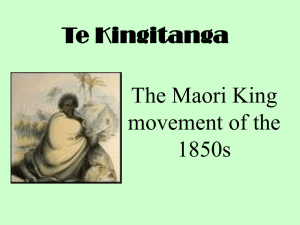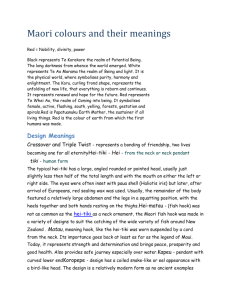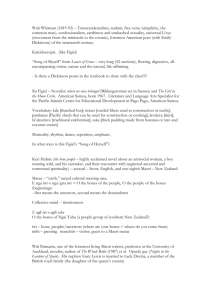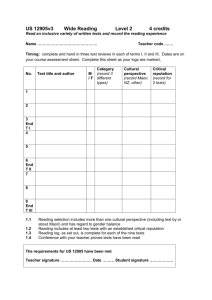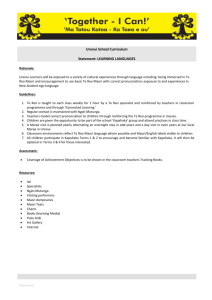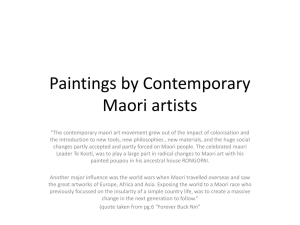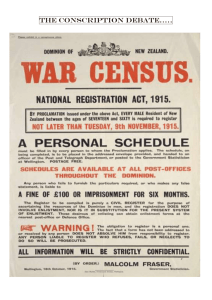Draft set of Māori Ethical Principles for Public Health
advertisement
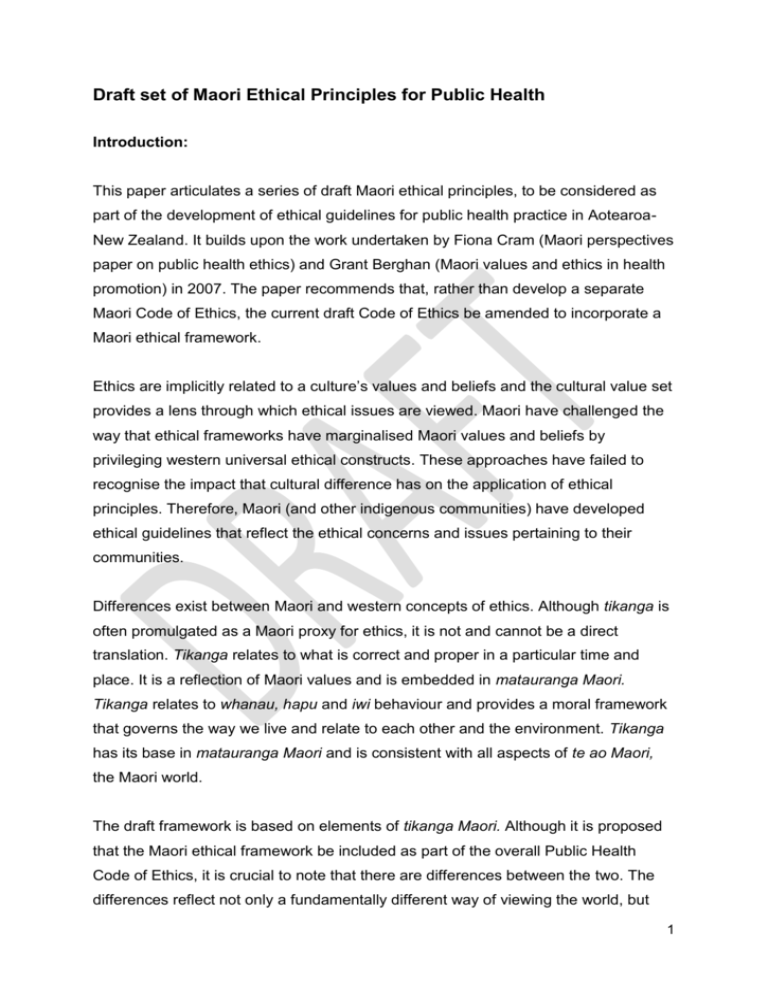
Draft set of Maori Ethical Principles for Public Health Introduction: This paper articulates a series of draft Maori ethical principles, to be considered as part of the development of ethical guidelines for public health practice in AotearoaNew Zealand. It builds upon the work undertaken by Fiona Cram (Maori perspectives paper on public health ethics) and Grant Berghan (Maori values and ethics in health promotion) in 2007. The paper recommends that, rather than develop a separate Maori Code of Ethics, the current draft Code of Ethics be amended to incorporate a Maori ethical framework. Ethics are implicitly related to a culture’s values and beliefs and the cultural value set provides a lens through which ethical issues are viewed. Maori have challenged the way that ethical frameworks have marginalised Maori values and beliefs by privileging western universal ethical constructs. These approaches have failed to recognise the impact that cultural difference has on the application of ethical principles. Therefore, Maori (and other indigenous communities) have developed ethical guidelines that reflect the ethical concerns and issues pertaining to their communities. Differences exist between Maori and western concepts of ethics. Although tikanga is often promulgated as a Maori proxy for ethics, it is not and cannot be a direct translation. Tikanga relates to what is correct and proper in a particular time and place. It is a reflection of Maori values and is embedded in matauranga Maori. Tikanga relates to whanau, hapu and iwi behaviour and provides a moral framework that governs the way we live and relate to each other and the environment. Tikanga has its base in matauranga Maori and is consistent with all aspects of te ao Maori, the Maori world. The draft framework is based on elements of tikanga Maori. Although it is proposed that the Maori ethical framework be included as part of the overall Public Health Code of Ethics, it is crucial to note that there are differences between the two. The differences reflect not only a fundamentally different way of viewing the world, but 1 also the right for Maori to exercise control over Maori matters. The notion of a “moral multi-culturalism” accepts that ethical principles are relative and are contextually bound rather than absolute. Therefore, in seeking to incorporate a Maori ethical framework within a western ethical framework, the challenge is to both acknowledge and give effect to different cultures’ perceptions of what is good or desirable. This is probably most easily illustrated by the following diagram: Public health issue Maori view of the issue Maori ethical perspective Western ethical perspective Western view of the issue Common ground Points to note: The circles are dynamic and grow or shrink according to the issue. Where there is complete agreement, the circles would combine. Conversely, where there is complete disagreement, the circles would be independent of each other. In most cases, there are elements that intersect. The greater the agreement, the larger the intersection. 2 Criteria The following criteria have been applied to the development of these draft Maori ethical principles: Simple Relevant Acceptable Practical Effective The Draft Set of Maori Ethical Principles for Public Health 1. Implement Te Tiriti o Waitangi/the Treaty of Waitangi. Maori are tangata whenua and public health practice and policy shall embrace the provisions of Te Tiriti o Waitangi/the Treaty of Waitangi and tikanga Maori/cultural safety. 2. Rangatiratanga – public health actions and outcomes shall reflect the hopes and aspirations of Maori for self determination in respect of their own affairs. 3. Manaakitanga – public health practice shall demonstrate the ethic of care and support and reverence for all peoples – “he aha te mea nui o te ao, he tangata, he tangata, he tangata.” 4. Whanaungatanga – public health practice is about people and the relationships we have with each other in order to realise our potential and fulfil our purpose. 5. Kaitiakitanga – public health policies and practices shall reflect the custodial role we have of this planet on behalf of ourselves, our children and those generations yet to come. “Toitu he whenua, whatungarongaro he tangata – the land endures while people disappear.” 6. Wairuatanga – public health practice shall acknowledge and respect the right of all persons to spiritual freedom; 7. Kotahitanga – public health practitioners will seek to work in unity and harmony with each other and others. 3 8. Mana – Because mana is such an important concept in the Maori world, public health practice shall reflect an understanding and respect for it as it is applied to people (mana tangata), land (mana whenua) and spiritual matters (mana Atua). 9. Tika – public health practice will be based upon what is right and proper according to circumstance and in accordance with the common good. Draft set of guiding ethical principles for public health in Aotearoa – New Zealand. Mainstream ethical principles Maori ethical principles 1. Implement the Treaty of Waitangi Te Tiriti o Waitangi principle 2. Uphold self determination. Rangatiratanga principle 3. Ensure health equity Tika principle 4. Focus on prevention Tika principle 5. Place the disempowered first. Tika and Manaakitanga principles 6. Respect collective and individual Whanaungatanga and Mana principles rights. 7. Involve democratic processes. Tika and Whanaungatanga principles 8. Embrace partnership and Kotahitanga and Whanaungatanga diversity. principles 9. Enhance the environment. Kaitiakitanga and Wairuatanga principles 10. Have necessary information and Tika principle resources. 11. Obtain informed community Tika principle consent. 12. Act efficiently. Tika principle 13. Work collaboratively. Kotahitanga principle 14. Be competent and critically Tika principle aware. 4

